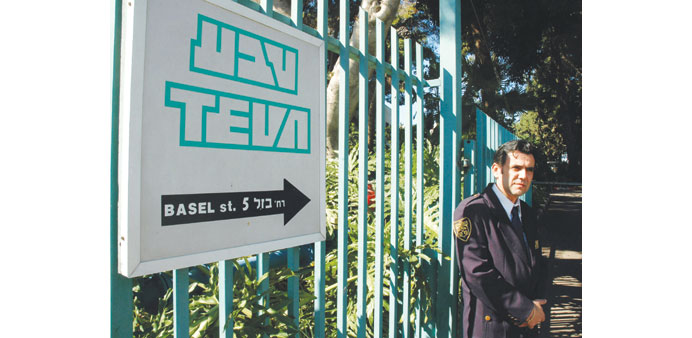A security worker guards Teva Pharmaceutical Industries headquarters in Petach Tikva, Israel (file). Teva will pay $33.75bn in cash and $6.75bn worth of shares at yesterday’s price to buy the generic-drug business of Allergan, a statement said.
Bloomberg
London
Israeli drug maker Teva Pharmaceuticals Industries agreed to buy the generic-drug business of Allergan for about $40.5bn in cash and stock, and ended its hostile bid for Mylan.
Teva will pay $33.75bn in cash and $6.75bn worth of shares at yesterday’s price, or about 10% of the enlarged company, the Petach Tikva, Israel-based company said in a statement.
Teva surged as much as 12% as trading resumed in Tel Aviv. Mylan shares were down 12% in US premarket trading.
The deal bolsters Teva’s position as the world’s largest maker of generic drugs, and gives it greater negotiating power with governments and private-health insurers. It also allows the drug maker to extricate itself from an increasingly antagonistic pursuit of Mylan, which is in the midst of trying to buy Perrigo Co.
“We’re looking at a fairly similar deal to the Mylan offer but without all the uncertainties attached to a hostile situation,” said Jonathan Kreizman, an analyst at Bank of Jerusalem. “Teva and Allergan have less overlap than Teva and Mylan.”
The acquisition extends a wave of mergers that has swept over the health-care industry. Announced pharmaceutical deals so far this year have topped $180bn, according to data compiled by Bloomberg. That’s on pace to beat last year’s record of more than $200bn.
Allergan, which makes the blockbuster wrinkle treatment Botox, said on Sunday it would buy the biotech company Naurex, which is developing a fast-acting antidepressant. The $560mn all-cash transaction is expected to close by year-end.
Teva expects its Allergan transaction, which both boards backed unanimously, to close in the first quarter of 2016 and boost earnings per share. Also yesterday, the company raised its earnings per share estimate for 2015 to between $5.15 and $5.40, up from an earlier forecast of $5.05 to $5.35. Earnings per share were $1.43 in the second quarter, Teva said.
Teva had been pursuing a $40.1bn deal to buy Mylan since April, a merger rejected by Mylan management as culturally unfit. Last week, Mylan’s independent foundation exercised an option to acquire shares that let it control half of the company in a move that rendered Teva’s attempt to win over a majority of its shareholders much more difficult. Abbott Laboratories, Mylan’s top shareholder, in June said it backed Mylan’s plan to avoid being taken over by Teva.
Bloomberg reported on July 25 that Allergan was exploring a breakup of the company, including the possible sale of its generics business. Mylan is pursuing Dublin-based Perrigo, a campaign that may now get fresh impetus as pressure mounts to become bigger. Perrigo, which makes prescription and over-the-counter drugs, has thus far rebuffed Mylan’s $33bn offer.
Mylan will continue its pursuit of Perrigo and expects that Mylan shareholders will vote “in the next several weeks” to support a purchase, the company said in a statement. Perrigo shares rose 2.4% in premarket trading as of 6:55am in New York.
Teva, which had accumulated a 4.6% stake in Mylan ahead of a potential legal battle, said yesterday it will “review its options” on the holding.
Teva may have a key advantage in integrating Allergan’s generic business because its own head of generics, Siggi Olafsson, formerly led that business at Allergan. Olafsson was brought in to Teva after leaving Actavis Plc, which switched its name to Allergan after agreeing to buy the maker of Botox in November 2014 for $66bn.
“Teva’s head of generics knows the business well, so he should be successful in integrating it,” said John Park, co-portfolio manager at Jackson Park Capital’s Oakseed Opportunity Fund, which owns Teva shares.
Actavis agreed to buy Allergan after spending months locked in bitter conflict with Valeant Pharmaceuticals International, a rival drug maker that had started a hostile takeover effort. The deal was completed in March. The generics business generated sales of $6.75bn last year.
Teva is a “natural consolidator” in generic medicines, Allergan CEO Brent Saunders said in an interview on CNBC. The deal took three weeks to complete, from start to finish, he said.
Much as Teva had sought with the Mylan approach, Allergan’s generic division will allow it to immediately grow in size and have more negotiating power with US payers, which have been consolidating in recent years. Teva said the combined entity will have pro-forma revenue of about $26bn and achieve cost and tax savings of approximately $1.4bn annually.
“While this is a potential rapid pivot from the pursuit of Mylan, we believe the strategic rationale is exactly the same,” said Ken Cacciatore, an analyst at Cowen & Co in New York. “There is only one good and meaningful way to maximize the value of these large, mature generic franchises and that is to extract maximum cost synergies.”
The deal doesn’t include Allergan’s programme to develop biosimilar drugs, which Louise Pearson, an analyst at Berenberg, said is “disappointing given the gap in Teva’s portfolio.” Even so, the deal has “obvious benefits” including Allergan’s generic injectables and an improved geographic reach, including in India, she said.
Allergan’s Saunders said the deal terms were “compelling” and that the company can now focus on higher-margin branded medicines and the aesthetics business that includes Botox.
Barclays and Greenhill & Co are serving as financial advisers to Teva. Sullivan & Cromwell LLP and Tulchinsky Stern Marciano Cohen Levitski & Co are its legal counsel.
Teva said most of the cost and tax savings should take place by the third anniversary of the deal’s close. The savings will come from efficiencies in operations, manufacturing, and sales and marketing, it said.
Teva will hold a conference call at 8am New York time.

